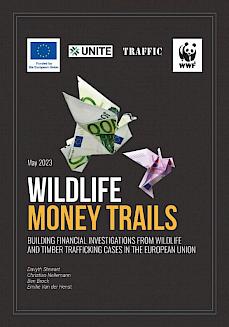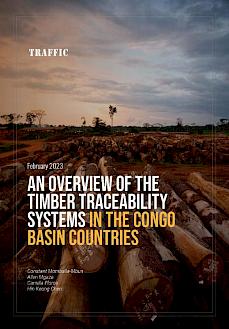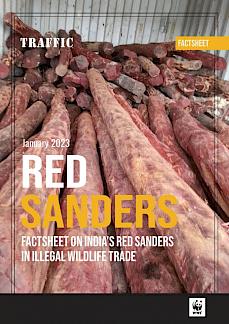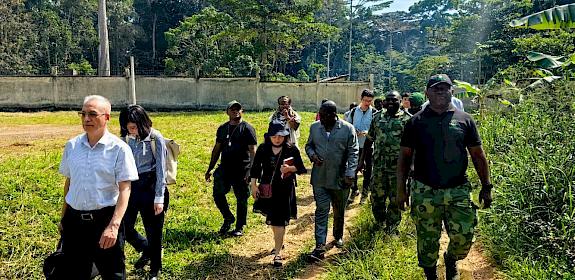
Ensuring sustainable practices and effective regulation throughout trade supply chains is the focus of our work within timber trade © A. Walmsley / TRAFFIC
i
working towards sustainable timber trade
Timber is the world’s most valuable wildlife commodity in trade, employing millions of people throughout supply chains across the globe. But if current levels of mismanagement, illegal activity and unsustainable practices continue, some of the world's most precious ecosystems could disappear within a matter of decades.
TRAFFIC is working in numerous African countries to help build the systems needed to ensure national and international regulations are effective and understood. This would allow legal, responsible trade to benefit local communities and does not threaten natural biodiversity. We simultaneously work in destination countries for timber, such as in Europe and Asia, to help enforcement agencies detect when threatened timber species are being traded.
US$10 billion
is lost from the global market each year from illegal logging according to the World Bank

Timber trade regulation is a complex issue. But ensuring that those involved understand their sustainability obligations is the only way we can ensure the survival of our rainforests
Chen Hin Keong, TRAFFIC's Timber trade Programme Leader
the issues behind timber trade
Rainforests across Africa, Asia and South America support an abundance of wildlife.
In many countries, timber trade is an essential source of income, integral to supporting the national economy and providing a livelihood to local communities. But illegal logging is a devastating issue in Africa and the Americas, as a "gold rush" to meet demand for tropical timber has led many to fell trees indiscriminately and outside the law. The issue is compounded by corruption, resource mismanagement and ineffective regulation, making it all to easy for criminals to illegally harvest and trade in threatened timber.
our overall approaches
training enforcement
identifying processed timber species throughout supply chains can be challenging, so we're providing border officers with training tools
international policy
we recommend on and support adherence to international trade regulations, such as CITES, to help protect threatened species
legality frameworks
we work to ensure that national regulations are understood by companies throughout timber supply chains
national legality frameworks
Whether knowingly or unknowingly, a huge proportion of the global trade in timber breaks national or international law.
If we can't strengthen enforcement against illegal loggers and ensure that the private sector understands what they can or can't do, the future biodiversity of the world's forests looks bleak. National Legality Frameworks help companies understand how to conduct timber trade within the law. This is an example of a briefing document we circulate to timber companies within Cameroon.
projects working towards sustainable timber trade
China's Champions of Change
China's Champions of Change is an EU-funded behaviour change project in China which concentrates on reducing the consumption of pangolin products and tropical timber.
China is a major consumer market for wildlife products. Pangolins are prized throughout wide consumer demographics for their perceived social, medicinal and social benefits, and tropical timbers such as rosewoods Dalbergia spp. are widely used in furniture and ornamental items.
Supporting enforcement in combating illegal timber
A lack of capacity and, in some cases, expertise is hampering efforts to correctly identify illegally sourced or restricted timber throughout global supply chains.
We're working with Customs and enforcement officers in source and destinations countries to equip them with the training, tools, and resources necessary for them to detect illegal timber and take the appropriate measures. This includes developing national legality framework training manuals and running workshops with enforcement officers.
The view over Mount Cameroon © A. Walmsley / TRAFFIC
i
Forest governance, markets and climate
Cameroon is a country of concern in terms of illegal logging and unsustainable timber trade, posing significant threats to natural biodiversity and harming national economies.
We're taking lessons learnt from work in Tanzania and elsewhere in Africa and applying them to develop strengthened national regulation, enforcement capacity, and private sector awareness to aid the transition towards sustainable timber trade from Cameroon.
A Customs officer inspects a lorryload of logs due for export in Douala, Cameroon © A. Walmsley / TRAFFIC
i
related news and reports to sustainable timber trade
explore related materials and news on timber trade and the journey towards sustainability
related reports to TIMBER TRADE
Explore the latest publications, reports and papers from TRAFFIC related to timber trade.
Visit our resource library for the full TRAFFIC publication archive.






